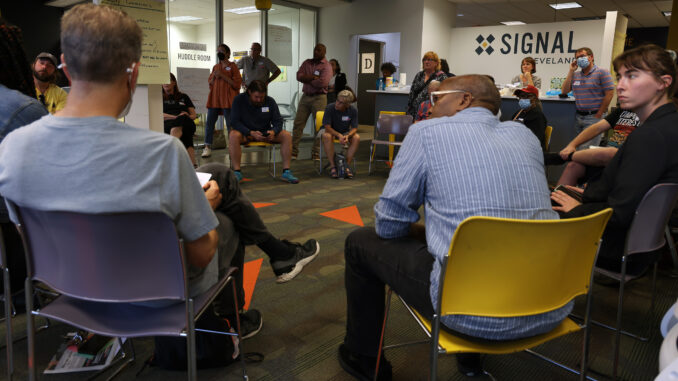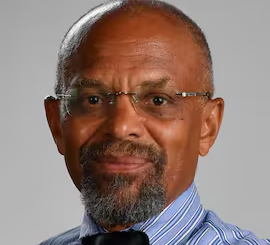
By Jaden Perry, NABJ Monitor
Nationwide, audiences are disengaging with traditional news media. As readership steadily declines, two Cleveland newsrooms, Signal Cleveland and The Land, are reshaping local journalism and giving storytelling power back to community members.
Signal Cleveland was the founding location of Signal Ohio in 2022 as a collection of newsrooms that include Akron and Cincinnati. Though the nonprofit is in its infancy, it has seen rapid expansion across the state. Nationally, however, many newsrooms can’t report that same success.
According to the 2024 State of Local News Report, print and digital newspaper readers have “dramatically” declined over the past 20 years. In 2023 alone, the top 50 weekly and daily newspaper publishers lost roughly 2 million print and digital readers.
Worsening the outlook for local news outlets, only 11% of adults expressed a “great deal” of confidence in election-related content produced by local newsrooms, according to a 2024 study by AP NORC.
With over 30 journalists statewide, Signal Ohio is a small newsroom — that’s until you add the over 1,000 residents who have contributed to the organization’s efforts.
Known as their “Documenters” program, residents living in and around Signal Ohio cities are given the opportunity to sign up and help take notes on local government meetings. The program originated in Chicago through the civic media organization City Bureau, eventually making its way to Signal Cleveland.
But before residents grab their pen and pad to attend meetings, Signal staffers train residents on basic journalism ethics and note-taking techniques. Once members complete the training and attend their government meeting, they can make at least $75 — a “civic side gig,” as Signal Cleveland’s Editor-in-Chief Lila Mills puts it. Once turned in, notes are filtered through a chain of fact-checkers before they’re used by Signal journalists.
“I think people want information earlier in what might be the traditional news cycle. So when they can still do something about it, I think people are hungry to do something,” Mills said. “They want to be active.”
Presenting many positives to the Cleveland community, the program reflects the diversity of the Midwest city, promotes civic engagement among its members and eases the work of Signal journalists.
“It doesn’t matter to us why you want to come into the community, but we feel like that’s a kind of key component of helping us stay in tune with our different communities,” Mills said.
Beyond training, the Signal team maintains communication with the community in other ways. Sometimes, Signal will invite residents to public events where they can interact and ask questions about the newsroom’s stories. It’s also not uncommon for Mills to have one-on-one meetings with community members, which helps her gauge the needs of the community.
Documenters also collect news tips for the nonprofit. If they don’t understand something in the meetings they attend, Signal journalists will compile their questions and write in-depth stories answering them. Those stories can be found in their series, “The Follow Up.”
“When you kind of invite people in, they’re going to bring up different questions and ask different questions,” Mills said. “And that leads to a lot of the explanatory work we do, because, especially a well-informed beat reporter, may be so deep in the issue that they don’t realize that it needs a little bit more explaining before it comes to [a] regular reader.”
Though the documenters program has proved successful in connecting with the local community, Signal Cleveland leans into service journalism, podcasting, SMS text notifications, social media and daily newsletters to meet audiences wherever they get their news.
Sometimes, residents have a bigger appetite for civic engagement — that’s where The Land comes into play.
Through The Land’s community journalism program, Clevelanders have the opportunity to report on stories within their community and get their work published.
“It’s basically like a crash course where they get to learn how to write like a journalist, how to interview like a journalist, how to edit like a journalist, all the things,” said Faith Boone, the longest-serving mentor of The Land’s community journalism program.
Prospective storytellers go through a 12-week training and, just like Signal Cleveland, members reflect the diversity of Cleveland’s population, with members ranging from high school students to retirees. So far, over 100 residents have graduated from the nonprofit.
Despite not having the years of formal training that professional journalists have, residents bring a unique perspective to community journalism, fostering a sense of connection and pride with their community.
According to Boone, some journalists have a habit of “helicoptering in” on a story, covering it, then never providing follow-up to how those communities are doing after the fact. This, paired with heavy coverage of crime and big companies, Boone said, overshadows the voices of community members and dissuades them from following the news.
Through The Land’s program, that power is given back to community members.
“It’s just the opportunity to be able to share not just your own voice for your community, but to open up the possibilities of helping your community have a bigger voice in general,” Boone said.
The Land takes this concept of uplifting community voices a step further. Through their website, news organizations can “steal” their stories and republish them on their platforms as long as writers are credited.
Boone, who’s passionate about community journalism, plans on visiting Lakewood High School later this fall as part of a new program run by The Land.
“Local journalism is getting a lot of play these days. And I think it’s because people are finally seeing how important it is to share the voices of the people that actually live in] the communities,” Boone said.




Be the first to comment